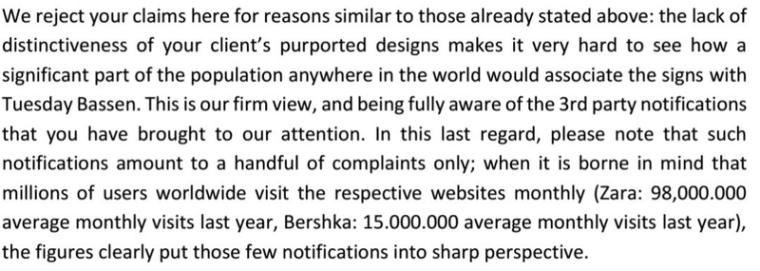At first glance, the comparisons cult artist and designer Tuesday Bassen has drawn between her own pins and patches and those sold at Zara are convincing. At second, closer examination, even more so: a transparent heart lollipop patch has identical white marks, a "Girls" banner is rendered in the same shade of light pink, an eraser with "Erase you" scrawled across it has the exact same lines. But even more disturbing than the blatant infringement is the callousness of the statement Zara has issued Bassen, attached to the second half of the image above. "The lack of distinctiveness of your client's purported designs makes it very hard to see how a significant part of the population anywhere in the world would associate the signs with Tuesday Bassen." Zara's website, it goes on to note, has just under 100,000 monthly visitors; Bassen has 100,000 followers. In other words: we're bigger than you, so shut up.
 An excerpt from Zara's response to Tuesday Bassen
An excerpt from Zara's response to Tuesday Bassen
This is far from the first time Zara — regarded as a more sophisticated fast fashion alternative to H&M or Forever 21 — has been accused of infringing on the artwork or intellectual property of an independent artist. The kind of artist, Bassen points out both in her Instagram caption and in an interview with The Fashion Law, who can bankrupt themselves merely hiring a lawyer to pen their cease & desist.
Bassen is pursuing her case under copyright law, but her complaints fall in the shadow of a much larger, industry-wide problem of cribbing the work of small, independent artists and hoping they won't notice — or simply telling them to fuck off if they do. This phenomenon is markedly more predatory than the kind of ripping off fast fashion has built its business on — mimicking the designs and aesthetics of larger luxury labels like Céline or Chloe. Which, The Fashion Law notes, they're able to accomplish by copying "the same overall look and feel of the original designer pieces in the mind of the fashion-minded consumer without technically infringing the design house it is channeling by copying a logo or print or design patent-protected staple."
 Zara's 2016 "Streetwise" Collection
Zara's 2016 "Streetwise" Collection
Circumventing patents and sliding just under the threshold of copyright infringement takes on a distinctly more sinister tone when you consider artists like Tuesday Bassen, whose work and success lives and dies by their very personal brand, curated online, and whose main draw is their individuality. Zara's international team of anonymous designers can be particularly brazen — take, for example their releasing a collection of oversized, dusty-colored separates immediately after Kanye showed Yeezy Season Two, beating him to market.
While an artist with the cache of Kanye might not see the value of his brand suffer from copycatting, the same cannot be said of both these smaller artists and even the high fashion industry, whose anxiety over Zara's production cycle is one of the contributing factors in the emerging popularity of a new "see now, buy now" model in which runway clothes are instantly available. While Tuesday Bassen's story has captured the hearts and minds of the internet outrage cycle for the day, it's clear that greater reforms and strictures need to be put in place to protect designers and artists' original works, ensuring there's a way to say "fuck you" right back.
The FADER has reached out to Zara and will update this post if we hear back.